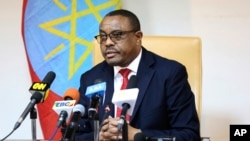Ethiopia's parliament has confirmed Abiy Ahmed as the country's new prime minister.
The ruling coalition voted him as its chairman last week, a move that set the stage for Ahmed to become the country's third prime minister in 23 years.
Ahmed replaces Hailemariam Desalegn, who stepped down in February amid ongoing civil and political unrest across the country.
The U.S. Embassy in Ethiopia said in a statement that it commended "the peaceful transfer of power in accordance with Ethiopia's constitution . . . "
Varied background
Ahmed, 41, has spent less than a decade in politics. Before joining the House of Representatives in 2010, he became a lieutenant colonel in the Ethiopian National Defense Force.
In 2007, he founded and later directed the Internet Security Agency, a group tasked with advancing Ethiopia’s technological capabilities, but also responsible, in part, for what human rights groups consider mass government surveillance to stifle dissent.
Ahmed studied in the U.S. and England before returning to Ethiopia to pursue a doctorate at Addis Ababa University’s Institute for Peace and Security Studies. In 2015, he became Ethiopia’s minister for science and technology while a Ph.D. candidate in Peace and Security Studies.
Likely pick
Ahmed had been considered a front-runner since Hailemariam's surprise resignation on Feb. 15. As the leader of the Oromo Peoples’ Democratic Organization, the EPRDF Party that represents the country’s largest ethnic group, Ahmed is considered an insider with a decades-long affiliation with the ruling coalition.
Ahmed speaks Amharic, Afan Oromo and Tigringna, and he was born to a Christian mother and Muslim father, according to freelance journalist Mohammed Ademo.
As a member of Ethiopia’s Oromo ethnic group, a majority that has long felt marginalized, Ahmed’s background might help him bridge growing rifts across the country.
Ethiopia is currently under its second state of emergency in two years in the wake of unrelenting protests in the Oromia and Amhara regions. One of the protesters’ primary demands is equal representation in government.
The U.S. embassy said in its statement, "We stand ready to support the goverment's rapid implementation of democratic and economic reforms, and look forward to the lifting of the State of Emergency."
Despite holding the most seats in the federal parliament, the OPDO, which represents the Oromo people, holds less power than the dominant Tigrayan People’s Liberation Front, according to activists and human rights groups.
More recently, however, OPDO has gained its voice and expressed solidarity with the Oromo protesters, according to René Lefort, a journalist who has covered the region since the 1970s.
"The main change is that first of all, OPDO asserted itself more than ever," Lefort told VOA by phone in November.
The protests have put pressure on the government, resulting in EPRDF’s decisions to release prisoners and jockey over reforms. But the coalition has also backtracked on promises to allow space for a plurality of voices in the country.
Bloggers, journalists and members of opposition groups were recently re-arrested for gathering at a colleague’s home to celebrate their work.
Human Rights Watch’s senior researcher for the Horn of Africa, Felix Horne, said on Twitter, "Many thousands of people welcomed their release just over one month ago. Now the Command Post re-arrests them? Hard to imagine a more ineffective strategy at calming growing tensions."
How Ahmed plans to lead, and what steps the EPRDF will take to address growing turmoil, will now shape the country’s future.





